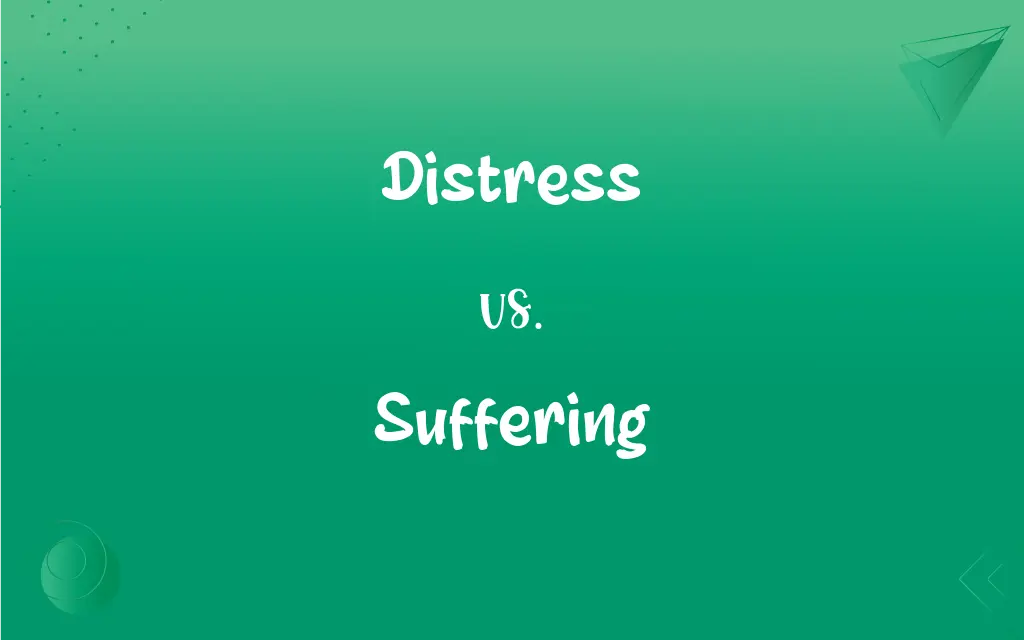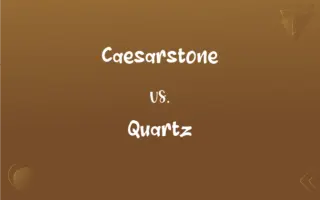Distress vs. Suffering: What's the Difference?
Edited by Aimie Carlson || By Janet White || Published on December 8, 2023
Distress is acute, intense discomfort or pain, often reacting to a specific stressor, while suffering is a broader, more prolonged experience of pain, discomfort, or hardship, which can be physical, emotional, or existential.

Key Differences
Distress is typically an immediate reaction to a stressor, characterized by intense feelings of strain and anxiety. Suffering, on the other hand, encompasses a wider range of experiences, often involving prolonged pain, sadness, or hardship.
The nature of distress is usually acute, arising from specific circumstances or events. Suffering can be more chronic, persisting over time and often linked to broader life conditions or existential crises.
Distress often triggers a noticeable physiological or psychological response, like panic or worry. Suffering may not always manifest outwardly but can entail deep, internal experiences of anguish and despair.
Distress can be alleviated once the immediate stressor is removed or resolved. Suffering, however, may require more extensive processes to address, such as therapy, support, or significant life changes.
Distress is commonly used in contexts of short-term challenges or emergencies. Suffering is more often associated with long-term issues, chronic conditions, or profound personal trials.
ADVERTISEMENT
Comparison Chart
Duration
Short-term, acute
Long-term, chronic
Trigger
Specific stressor or event
Broad, often complex causes
Manifestation
Immediate physiological or psychological response
Deeper, prolonged experience
Resolution
Often resolved with removal of stressor
Requires more in-depth intervention
Context of Use
Short-term challenges or emergencies
Chronic issues, existential crises
ADVERTISEMENT
Distress and Suffering Definitions
Distress
Extreme anxiety, sorrow, or pain.
The news of the accident caused her great distress.
Suffering
Enduring pain or discomfort over a period.
He spoke about his suffering during the war.
Distress
A state of danger or desperate need.
The stranded hikers signaled for distress.
Suffering
The experience of being subjected to something bad or unpleasant.
The country's suffering during the economic crisis was profound.
Distress
The negative stress affecting one's wellbeing.
Financial problems put them in severe distress.
Suffering
A period of undergoing adverse conditions.
Their suffering increased with the harsh winter.
Distress
Acute physical or mental suffering.
He was in distress after losing his job.
Suffering
The state of undergoing pain, distress, or hardship.
Her suffering was evident during the long illness.
Distress
A condition of being in trouble or discomfort.
The drought put the farmers in distress over their crops.
Suffering
The act of bearing or enduring pain or distress.
Her suffering in silence was a testament to her strength.
Distress
To cause strain, anxiety, or suffering to.
Suffering
The condition of one who suffers; the bearing of pain or distress.
Distress
To mar or otherwise treat (an object or fabric, for example) to give the appearance of an antique or of heavy prior use.
Suffering
An instance of pain or distress.
FAQs
Is distress always visible?
Not always; some people may hide their distress.
Is it possible to experience distress without suffering?
Yes, one can experience distress without it developing into prolonged suffering.
Can distress lead to suffering?
Yes, if distress is prolonged or unresolved, it can evolve into suffering.
Can suffering be both physical and emotional?
Yes, suffering encompasses both physical and emotional experiences.
How can distress be managed?
Through coping strategies like relaxation techniques, seeking support, or addressing the stressor.
What is the key difference between distress and suffering?
Distress is acute and often short-term, while suffering is more prolonged and can be deeper.
Is suffering a part of the human condition?
Many philosophies and religions consider suffering an inherent part of human life.
Is psychological distress different from physical distress?
Yes, psychological distress pertains to mental and emotional strain, while physical distress relates to bodily pain.
Can animals experience distress and suffering?
Yes, animals can experience both distress and suffering.
Does suffering always have a clear cause?
Not necessarily; sometimes, suffering can be due to complex or existential reasons.
Can suffering be alleviated?
While it may not always be eliminated, suffering can often be alleviated through support, therapy, and coping strategies.
What role does resilience play in handling distress?
Resilience helps individuals cope with and recover from distress more effectively.
Does everyone experience suffering the same way?
No, individuals' experiences of suffering can vary widely.
Can chronic illness lead to suffering?
Yes, chronic illnesses often lead to prolonged suffering.
How can one help someone in distress?
By offering support, listening, and helping address the immediate stressor.
Is it possible to live a life free of suffering?
While it's difficult to completely avoid suffering, its impact can be managed.
Can mindfulness reduce suffering?
Mindfulness practices can help individuals cope with and reduce the intensity of suffering.
Can suffering lead to personal growth?
Many believe that enduring suffering can lead to resilience and personal growth.
Are there common causes of distress?
Yes, common causes include financial problems, relationship issues, health concerns, and emergencies.
How do cultural differences impact the perception of suffering?
Cultural backgrounds can significantly influence how suffering is perceived and expressed.
About Author
Written by
Janet WhiteJanet White has been an esteemed writer and blogger for Difference Wiki. Holding a Master's degree in Science and Medical Journalism from the prestigious Boston University, she has consistently demonstrated her expertise and passion for her field. When she's not immersed in her work, Janet relishes her time exercising, delving into a good book, and cherishing moments with friends and family.
Edited by
Aimie CarlsonAimie Carlson, holding a master's degree in English literature, is a fervent English language enthusiast. She lends her writing talents to Difference Wiki, a prominent website that specializes in comparisons, offering readers insightful analyses that both captivate and inform.







































































